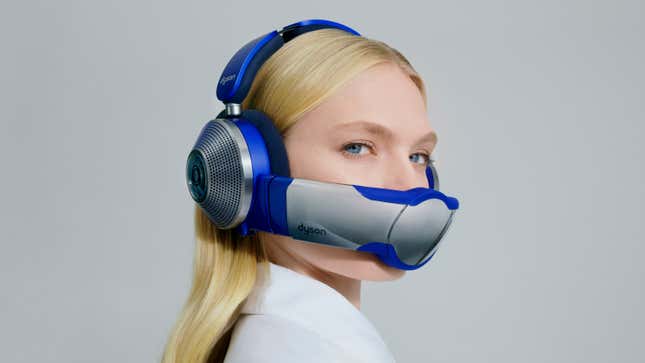
Earlier this year, Dyson revealed its first audio product, a pair of headphones that promised to not only block noise, but unwanted airborne particles as well, thanks to a built-in filtration system and mask. Today, the company revealed more details on the Dyson Zone, including when you’ll be able to buy a pair and how much having a breath of fresh air available wherever you roam will cost you.
Dyson is a company best known for the innovation it brought to vacuum cleaners, eliminating the need for disposable bags and ensuring maximum suction even as its cleaners fill up with dirt. Over the years, the company has been slowly branching out its product offerings, but mostly sticking to devices that move air, which is Dyson’s specialty—think fans, air filters, and even hair dryers.

The Dyson Zone headphones also fall into that category, with an unorthodox design that integrates the smallest 10,000 RPM electric motors the company has ever developed into each ear cup, letting the purifier on the front draw air through dual-layer filters to remove particles like pollen, bacteria, and dust, plus gases like nitrogen dioxide, sulfur dioxide, and ozone. However, as Dyson has pointed out before, the Zone headphones don’t create a perfect seal and are not a solution for minimizing the risk of Covid-19 exposure.
The clean air is then directed to the wearer’s mouth and nose through a magnetically-attached mask that’s also designed to block wind. It’s a personal air filtration system designed for situations when a standing air filtering fan is useless, like a daily commute through a car-clogged city. According to Dyson, those filters will need to be replaced roughly every 12 months, with an accompanying app providing reminders when a swap out is needed.
Active noise cancellation almost seems to have replaced sound quality when it comes to what premium headphone makers focus on, but the Dyson Zone has a unique challenge, with electric motors and fans sitting right next to a user’s ears. Both Apple’s AirPods Max and Sony’s WH-1000XM5 use eight microphones to capture and eliminate environmental noises, and the Dyson Zone does the same, relying on eight mics to reduce ambient sounds by up to 38-decibels. However, it also includes two additional microphones to deal with sounds from the air filtering system, plus one for picking up the user’s voice for phone calls.

The Dyson Zone’s 40-millimeter neodymium drivers are promised to reproduce frequencies from 6Hz to 21kHz, while a 2,600 mAh battery that can be fully recharged in about three hours offers up to 50 hours of audio enjoyment, even with ANC turned on. However, the Dyson Zone’s battery life takes quite a hit with the air filtration system activated. With the purifier on its lowest setting, the Dyson Zone’s battery life reaches just four hours, but drops to 2.5 hours on the medium setting, and a mere 1.5 hours with the air filtration system working as hard as it can. That’s more than enough for the average daily commute, but not really long enough to provide fresh air on most domestic or international flights, at least without an external power source.
These aren’t light headphones, either. The Sony WH-1000XM5 are some of the most comfortable premium ANC wireless headphones we’ve ever tested, weighing in at just 249 grams. We’re also big fans of the Apple AirPods Max, but with premium materials like aluminum (used for the ear cups), they weigh in at 384.8 grams, which you can definitely start to feel after prolonged listening sessions. With the visor attached, the Dyson Zone is actually heavier than both the WH-1000XM5 and AirPods Max combined, at 670 grams. But even with the visor removed, they’re still a hefty 595 grams.
But an hour-and-a-half of maximum air filtering on a single charge and a real neck workout isn’t what will give most consumers pause when it comes to choosing the Dyson Zone over other premium headphone options. The $550 Apple AirPods Max and $400 Sony WH-1000XM5 almost seem like a bargain compared to the $949 Dyzon Zone, which can only be pre-ordered by appointment through Dyson’s stores starting in March, with wider availability through Dyson’s website “shortly after” that.
Dyson is known for its premium pricing, so a price tag approaching $1,000 for its first headphones isn’t entirely surprising. But you could buy both Apple and Sony’s best ANC headphones for the cost of the Dyson Zone, and it remains to be seen if the Zone’s performance, even just as regular noise-canceling headphones, outshines the competition enough to justify the cost.